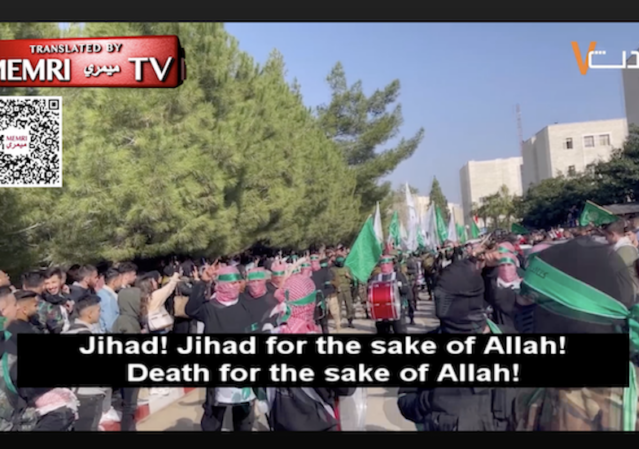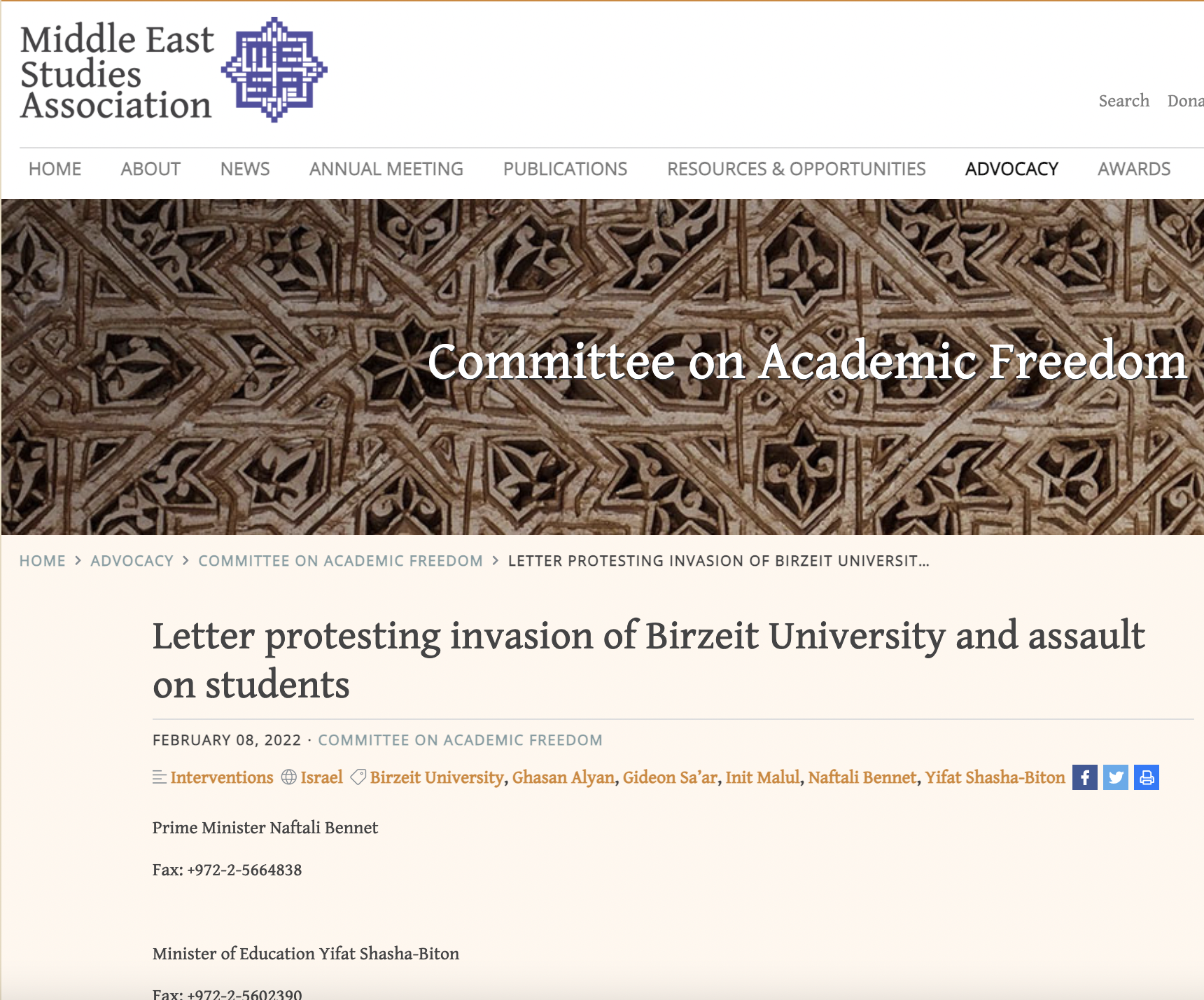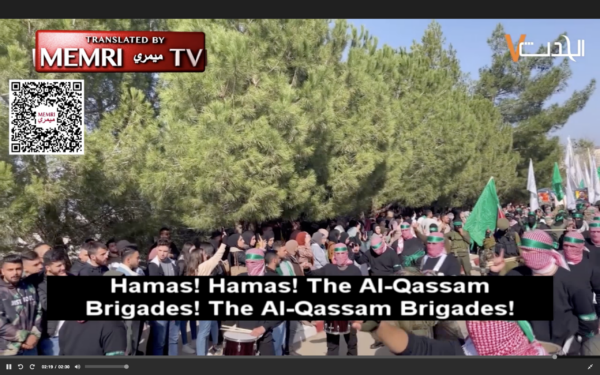Middle East Studies Association Defends Terror-Infused Palestinian University, While Moving To Boycott Israeli Academia
MESA membership is voting now on a resolution to boycott all Israeli academic institutions. After the IDF arrested five student operatives at a Hamas stronghold, MESA accused Israel of a “horrifying escalation of ongoing assaults on Palestinian universities.”

Over the last several months, West Bank universities have been regularly roiled by political and other violence, including gunfire and a stabbing death. As a result, Palestinian Authority police and security authorities have made arrests and campus authorities have briefly closed at least three universities and suspended student political activities. Israel has also arrested five suspected members of Hamas terror organization.
But don’t worry: Middle East Studies Association’s so-called Committee on Academic Freedom is on the case, complaining about – Israel!
Bir Zeit University, near Ramallah, was briefly closed in December after rival factions repeatedly engaged in violence. Bir Zeit is a hotbed of anti-Israel activity and Hamas has a strong presence there. Khaled Abu Toameh reported for the Jerusalem Post: “The latest tensions at Bir Zeit University began earlier this month when a fight erupted between students affiliated with Fatah and others belonging to Hamas and the Popular Front for the Liberation of Palestine (PFLP).” In January, Palestinian students and political activists demanded the replacement of the Bir Zeit University administration, partly for its alleged failure to guarantee students’ safety, and partly for its supposed “collaboration” with Israel.
Last fall a leader of the Fatah student bloc at Arab American University in Jenin fatally stabbed another student, Mahran Khaliliyeh. Palestinian Authority security used force to disperse demonstrators protesting the killing, and campus authorities closed the university. PA security forces also arrested ten Fatah-affiliated students on suspicion of involvement in the murder. Whether those ten will face consequences is another matter. (The trial of PA security officials charged with murdering PA critic Nizar Banat, which began in September, has been dogged by charges that the PA has threatened witnesses and arrested people protesting Banat’s death.)
In November, Al-Quds University in Abu Dis, near Jerusalem, was briefly shut after masked gunmen threatened students and faculty members because of a dispute over a parking lot. The gunmen reportedly fired their weapons at the school’s entrances. The incident followed several nights of violence that “only ended after the PA dispatched police reinforcements and community elders intervened with the university administration.”
Hebron University also closed following widespread social media protests against a mixed-gender dance party. A PA Education Ministry official told local media the event “wasn’t sanctioned” by the ministry.
The Palestinian Authority Ministry of Higher Education and Scientific Research issued an official statement renouncing campus violence and calling for new penalties against violent behavior.
MESA’s Committee on Academic Freedom did not see fit to issue any complaints whatsoever against Hamas, Fatah, or any other group for fostering or participating in violence on campus, leading to the closure of multiple universities. MESA did not complain to the Palestinian Authority about its security police “invading” West Bank universities, violating Palestinian students’ protest rights by using force to disperse protesters, arresting ten students into a corrupt judicial system, or failing to keep campuses as “safe spaces” by maintaining order on campus. It certainly did not accuse Hamas, Fatah, or the PA of violating students’ free speech rights.
It did not write to the administrators of these four universities objecting to the campus closures, not even when officials shut down Hebron University over men and women dancing together. It did not accuse them of violating their students’ academic freedom, right to education, or right to socialize with whom they pleased.
On January 10, Israeli soldiers arrested five Bir Zeit University students affiliated with Hamas and other Palestinian factions.

MESA Committee on Academic Freedom sent a February 8, 2022, complaint letter to Israel about its “invasion” of Bir Zeit University.
Because of that, MESA issued a protest letter February 8, complaining about Israelis’ “storming of the gates of Birzeit University, arrest of five students and firing of live ammunition on university grounds.” MESA condemned the so-called “invasion” as a “horrifying escalation of ongoing assaults on Palestinian universities,” especially Bir Zeit. MESA complained that the arrests violated Palestinian students’ “right to peaceful protest… academic freedom and freedom of speech,” their “rights to education,” and were “part of a larger assault on the Palestinian right to education.” MESA also asserted (without evidence) that the arrests were “arbitrary” and “turn[ed] campuses from safe spaces into zones where students’ and staff members’ politics put them in grave danger.”
MESA did acknowledge that the arrested were “all of them part of the leadership of the student movement at Birzeit University” – leadership which is largely affiliated with Hamas.
In the midst of MESA’s vote to ratify its resolve to boycott, divest from, and sanctions against Israel for the crime of existing, MESA offers further proof that its goal is to discredit, hound, and humiliate Israel for defending itself, and not to improve the lives of Palestinians who are daily oppressed by violent and corrupt Palestinian kleptocracies, in both the West Bank and Gaza.
Some posts from our coverage of pending MESA boycott:
- Middle East Studies Association Moves Toward Endorsing BDS Academic Boycott Against Israel
- Florida State Drops Middle East Studies Association Membership As Group Moves Towards Israel Boycott
- DeSantis Office: Florida Opposes Middle East Studies Association Conducting BDS Anti-Israel Academic Boycott Through FSU
- Middle East Studies Association Boycotting Israel “Is Basically the Old Anti-Jewish Boycott”
- Middle East Studies Association Members In “Legal Jeopardy” If Carry Out Israel Boycott On Campuses
- Will George Washington U Let Middle East Studies Ass’n Operate International Anti-Israel Academic Boycott From Its HQ On GWU’s Campus?
- Membership Voting To Ratify Anti-Israel Academic Boycott Starts At Middle East Studies Association
- Middle East Studies Association Losing Institutional Members As Anti-Israel Boycott Resolution Voting Starts
 DONATE
DONATE
Donations tax deductible
to the full extent allowed by law.










Comments
Perhaps the narrative is falling apart and they need a common enemy to keep people from seeing that the Palestinians are their own enemy.
No doubt you are correct.